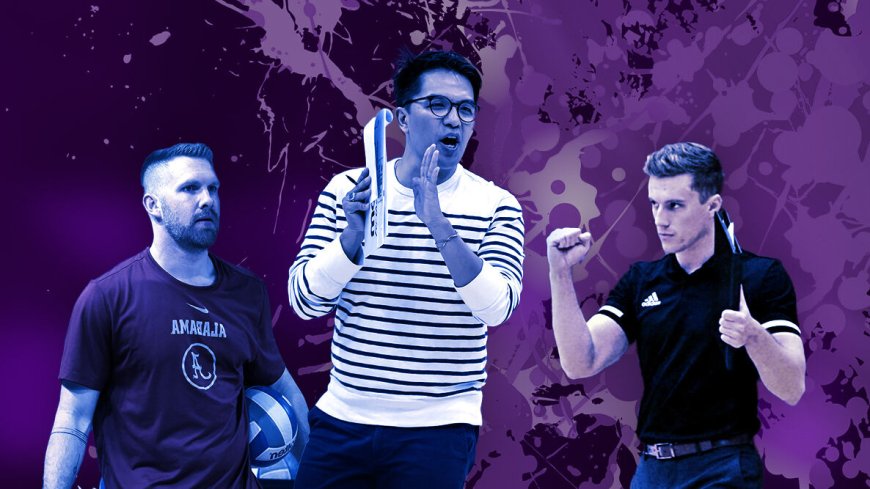Out gay male coaches find their niche in college volleyball
Rising 50: These seven out coaches show that the sport is welcoming to gay men, some of who see their queerness as an advantage. The post Out gay male coaches find their niche in college volleyball appeared first on Outsports.


In a college sports landscape where out gay male coaches are hard to find, volleyball stands out as a model of inclusivity.
On our Rising 50 list, as part of Outsports 2025 Power 100, we highlighted UCLA women’s volleyball coach Alfred “Alfee” Reft as emblematic of the increasing number of out gay men in college volleyball.
A far-from-exhaustive list of the out coaches finds assistants Nathan Matthews and Jake Barreau on the Alabama women’s team, while Coleman Lee has had great success leading Central Methodist University in Missouri. Anders Nelson restarted the women’s program at Vanderbilt after 11 seasons as an assistant at Kentucky that included a national title. At Texas State, Sean Huiet is an out gay man who has talked about raising an adopted Black son, while Andrew Brown has had great success leading New York University.
Related
Rising 50 highlights powerful LGBTQ up-and-comers and veterans in sports on Power 100
Outsports Power 100 this year features a Rising 50 of out LGBTQ people across sports who have power and influence.Gay volleyball coach marries ‘most beautiful soul’ in magical island wedding
Nathan Matthews and Daniel Koloff met playing volleyball and love bloomed. Their gay wedding on a Greek island cemented their bond.
“I know a lot of [gay male] coaches,” Matthews tells Outsports. “There’s certainly still room for improvement. I know some coaches still question how coming out will affect their career. But there’s more and more examples that you can be true to yourself, which is amazing.
Get off the sidelines and into the game
Our weekly playbook is packed with everything from locker room chatter to pressing LGBTQ sports issues.
Subscribe to our Newsletter today
“I am hoping to see men’s volleyball specifically continue to develop in that way.”
The point about men’s teams is important, because the coaches we highlight on the Rising 50 all coach on the women’s side. Matthews, though, had huge success in coaching Wittenberg (Ohio) College’s men’s team, where he won two coach of the year awards. In addition, there are many more times the number of women’s college teams (about 1,800) versus men’s (about 240), which means more opportunities.
Matthews said that he found the culture of volleyball appealing as a young athlete.
“A huge reason I fell in love with playing volleyball was because of the community,” he said. “The people were so welcoming and I felt like I could really be myself. I didn’t feel that with the other sports I played.”

Reft, who played in college at Hawaii, had a similar experience.
“I think the biggest thing for anyone is to feel seen, and to feel heard for who you are. When I was able to be out with teammates at the University of Hawaii, my game started to soar,” he told Outsports in 2023. “I felt seen, I felt supported, and was able to play a lot freer. I think that’s no coincidence.”
An advantage being a gay coach
Nelson, who started the Vanderbilt program from scratch and is in his third season, said that being gay is an asset in helping him prioritize his player’s needs as people.
“It’s made me a lot more aware of making sure that every player in our program feels like they have a place, and feels like they belong,” he said. “In college, I didn’t feel comfortable. I didn’t feel like I’d be accepted. Looking back, I would’ve been, but at the time, I didn’t feel like I could. I don’t ever want to make an athlete feel that way.”
At the Division III level, Andrew Brown has compiled a 162-51 record in six seasons at New York University and has led three trips to the NCAA tournament. He also said that being gay is an asset.
“I joke that I’m the perfect kind of hybrid coach for women’s volleyball,” he said. “Because I am gay, I’m very protective of them and making sure they’re safe, and I’m super supportive of them.”
While succeeding in Los Angeles and New York while being gay may not seem such a big deal, out volleyball coaches have thrived even in places that are politically and culturally conservative, such as Texas, Missouri, Oklahoma and Alabama.
“No question this is a conservative place, by and large, and it’s similar to Oklahoma in that way when we lived there,” Barreau said about moving with his husband to Alabama from Michigan. “However, nothing changes on our end. We are open and proud and will always find our community. We already have.”
As more coaches come out as gay in college, these seven can provide an inspiration for how being out can be much more an asset than a detriment.
If you know of any other out gay coaches we missed, drop us a line (team@outsports.com).
Subscribe to the Outsports newsletter to keep up with your favorite out athletes, inspiring LGBTQ sports stories, and more.
The post Out gay male coaches find their niche in college volleyball appeared first on Outsports.

 Mark
Mark 





